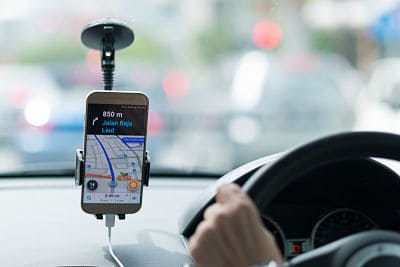 A new ballot measure has passed in California that classifies drivers for Uber, Lyft, and other gig economy companies as independent contractors instead of as employees.
A new ballot measure has passed in California that classifies drivers for Uber, Lyft, and other gig economy companies as independent contractors instead of as employees.
Uber and Lyft Sponsored Bill
On Election Day, 58 percent of California voters approved Proposition 22, a ballot measure that allows gig economy companies to continue classifying their drivers as independent contractors rather than employees.
Gig economy corporations Uber, Lyft, and DoorDash sponsored the measure to exempt them from a California labor law that would have forced these companies to employ drivers and pay for workers’ compensation, health insurance, unemployment, and other benefits. Ride-hailing and delivery start-ups spent $200 million in support of Proposition 22.
In response to labor advocates, Proposition 22 offers a wage floor and limited benefits to drivers. The initiative faced its strongest opposition in San Francisco, where Uber and Lyft have their headquarters, with more than a 19-point deficit.
The vote resolves the biggest regulatory battle that rideshare giants Uber and Lyft have faced and opens a path for the companies to remake labor laws throughout the country. By voting to support the companies, California residents rejected a 2018 State Supreme Court ruling and a 2019 state law that said that workers who performed tasks within a company’s regular business, were controlled by the company, and did not operate their own firms must be treated as employees. Under Proposition 22, gig workers are exempted from these rules and can continue to work independently.
“California has spoken,” said campaign spokesperson Geoff Vetter. “Proposition 22 represents the future of work in an increasingly technologically-driven economy.”
Proposition 22 Passage Considered a “Bitter Loss”
Proposition 22’s passage is considered a bitter loss for state and local officials who view these companies as upstarts who dismiss efforts to make them follow the rules. Many of them believed that California was too accommodating in terms of regulating Uber and Lyft and too naïve about how powerful and influential the companies would become.
“For all too long, Uber and Lyft banked on the timidity of public officials throughout the country,” said Dennis Herrera, the city attorney of San Francisco. “They said: ‘We’re not going to ask permission. We’ll sort of ask for forgiveness after the fact, once the horse has left the barn.’”
Uber and Lyft started with just a handful of drivers, resembling carpool services more than professional fleets. Uber initially tried to mimic black car services, but the company soon joined Lyft in promoting the idea that drivers were drawn to the apps by the novelty of gig work rather than the promise of traditional employment.
Public transit officials and cab companies warned that rideshare drivers did not have professional certification and did not receive background checks. Uber and Lyft argued that they were technology businesses, not transportation companies, and therefore should not be required to deal with licensing, safety, and employment requirements. The California Public Utilities Commission subsequently set baseline safety requirements but allowed Uber and Lyft to avoid hiring drivers.
In 2015, the state labor commissioner ruled that drivers were “integral” to Uber’s business model, though the ruling allowed just one driver to be classified as an employee. In 2018, the California Supreme Court made a unanimous ruling in Dynamex Operations West, Inc. v. Superior Court. Under the three-prong employment test proposed by the court, Uber and Lyft drivers appeared to be employees instead of independent contractors.
Gig economy companies did not move to reclassify their workers, and lawmakers saw an opportunity to regulate the industry. In Sept. 2019, the California State Legislature approved a law classifying gig economy drivers as employees. The law took effect in January 2020.
Nevertheless, Uber and Lyft continued to treat their drivers as independent contractors and vowed to take their fight to the ballot. In May, a state congresswoman, the state attorney general, and the city attorneys of Los Angeles and San Diego sued Uber and Lyft in an effort to enforce the law.
A court ordered the companies to immediately hire their drivers, but Uber and Lyft threatened to shut down in California rather than comply. The rideshare giants also funneled millions of dollars more into the ballot fight, making Proposition 22 the most expensive initiative in the state’s history. An appeals court also granted Uber and Lyft a reprieve, allowing them several months to comply with the order.
The lawsuit will continue, but Proposition 22 will drastically reduce its scope, with California only seeking penalties for the time between January and the certification of the election results.
Now that the gig work model has been cemented in California, Uber, Lyft, and other gig economy companies are expected to pursue federal legislation that would protect them from similar employment laws in other states.
The Difference Between Employees and Independent Contractors
Traditional employees are people who work for employers for a salary or an hourly wage, often with benefits such as workers’ compensation, health insurance, retirement accounts, and unemployment.
Independent contractors, however, are considered freelancers or self-employed people who are paid to perform services for another person or business. How are they different from employees?
Independent contractors typically have more control over how they do the jobs they have been hired to do, including setting their own hours. Because independent contractors are not classified as employees, the businesses who hire them do not withhold payroll taxes from the money paid to them, they typically are not entitled to unemployment benefits if they are fired, and they are usually not eligible for workers’ compensation benefits.
However, there are certain cases in which these independent contractors may potentially collect workers’ compensation benefits under the law in Illinois. This occurs when these workers are really mislabeled employees.
The Illinois Workers’ Compensation Commission (IWCC) takes a number of factors into consideration when determining if a worker is a true independent contractor or an employee, the key one being control. Employees are different from independent contractors because employers have more control over employees and how they do their work. But if employers exercise a similar level of control over “independent contractors,” the IWCC may conclude that the workers in question are effectively employees.
Factors that suggest control over an independent contractor that is similar to the control over an employee may include:
- That the contractor is exclusively bound to work for the employer.
- That the contractor has received a schedule.
- That the contractor has been given specific instructions on how to do the job.
- That the contractor has to wear a uniform.
- That the contractor obtains materials or tools from the employer.
If the above conditions are true, an “independent contractor” may actually be classified as an employee, one who would be eligible for workers’ compensation benefits for on-the-job injuries.
Workers’ Compensation Lawyers Helping Injured Employees
As you may see, even if someone has been injured on the job, that does not mean that he or she is automatically entitled to workers’ compensation benefits, especially in cases where the proper classification of the worker is in question. When workers cannot prove that they are actually employees, they may not qualify for the workers’ compensation benefits they deserve. For this reason, injured workers often find that they could benefit from experienced legal counsel, such as the kind they would receive from the workers’ compensation attorneys at GWC Injury Lawyers LLC.
With over $2 billion recovered in verdicts and settlements, GWC is one of the premier Workers’ Compensation and Personal Injury law firms in Illinois. For more than four decades, our dedicated workers’ compensation lawyers have been helping injured employees in practically every profession. GWC has the experience, the determination, the resources, and the reputation of success you need to get you and your family the justice you deserve.
If you have sustained a work injury or have questions about your rights under the workers’ compensation system in Illinois, please contact GWC today to schedule a free consultation with one of our attorneys. You may call our office at (312) 464-1234 or click here to chat with one of our representatives at any time.
<< BACK TO BLOG POSTS